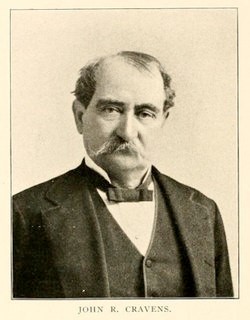Biographical Details
Date of Birth: November 22, 1819
Birth Location: Madison, IN, USA
Graduation Year(s): 1840
Degree(s) Earned: Bachelors
Date of Death: March 26, 1899
Death Location: Madison, IN, USA

Date of Birth: November 22, 1819
Birth Location: Madison, IN, USA
Graduation Year(s): 1840
Degree(s) Earned: Bachelors
Date of Death: March 26, 1899
Death Location: Madison, IN, USA
John Robert Cravens was born in 1819. He was the only son of a distinguished Madison, Indiana, physician. He was educated in Madison, Indiana; Xenia, Ohio; and Harrisonburg, Virginia. He resided in Madison and was a member and trustee of the Second Presbyterian Church. He received his bachelor’s degree from IU in 1840.
In 1847, Cravens’ father-in-law, who had risen from his law practice and become director of the Bank of Indiana, singlehandedly saved the state of Indiana from bankruptcy by negotiating half of its European creditors’ debt in exchange for foreign ownership of its transportation lines. During the Civil War, his father-in-law once again saved Indiana from bankruptcy, by loaning to its governor over a million dollars from his personal fortune (which the state eventually repaid).
Cravens tried his hand at milling for several years, but then his mill (in Madison) burned to the ground in March 1851. He was president of two Indiana railways until their reorganization forced his retirement. He then became editor and proprietor of the Whig paper, Madison Banner, but the Whig party disappeared, and he found journalistic life not to his liking. When the slavery issue came to the forefront of American politics, he found he was a natural-born orator and took to the Republican stump (giving the same speech repeatedly for different audiences). He became a party leader and served in the state Senate from 1856 to 1857 and in 1860.
In 1861, when the Republican victory that resulted in the Civil War swept Indiana along with it, Cravens became lieutenant governor. He served for two years and then enlisted at age forty-three in the Union Army, receiving a rank of major with a job as paymaster.
After the war, Cravens returned to politics and community investment in his hometown. He served the Indiana State Legislature as a senator from 1866 to 1873. He was president pro tempore of the state Senate, became judge of the circuit court, distinguished himself as a juror, and was a school trustee for both Hanover College and IU. He also did extensive work on the history of the buildings of IU. He was director of the Madison Hotel, the Madison Opera House Company, and the Madison Foundry.
James Lanier set up his first law office in the same house as Cravens’ father’s medical office in 1820. In 1844, Cravens married Lanier’s daughter, Drusilla Ann. Cravens and Drusilla had eleven children; the eldest and youngest were born twenty-three years apart. Cravens died in 1899, and his wife, Drusilla, in 1903. Upon his death, Cravens’ eulogist wrote, “he was a gentleman of the old school, and in him was mirrored the stately courtesy, the quiet dignity, and the cordial hospitality of the olden-time.”
Cravens’ son and namesake, John R. Cravens, Jr., was a railroad vice-president, who also acted as train conductor and engineer. Cravens Jr. co-authored an article in 1916 for Indiana’s 100th anniversary with firsthand accounts of Indiana’s pioneers.
Cravens was often belittled, both in private and public life, for his last name, which had the meaning of “coward,” including a publicized personal campaign attack by a sitting Indiana governor that was still remembered by his eulogist several decades later.